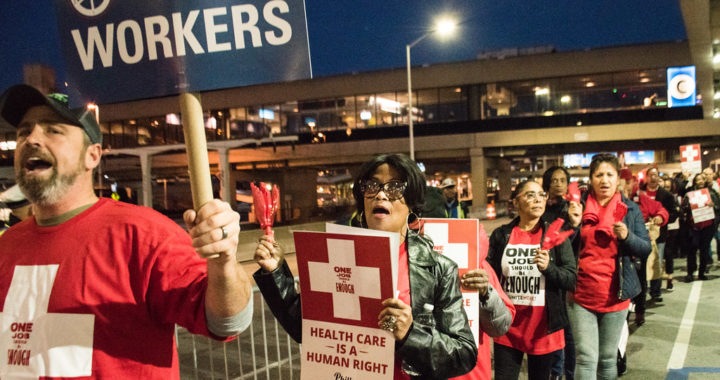‘How the Trump White House Sees You’: Top Economic Adviser Under Fire for Calling Workers ‘Human Capital Stock’
“They’ve always been indifferent to human life. And in the face of mass death, the masks are coming off.”
By Jake Johnson
In a remark critics characterized as further evidence that the Trump administration views workers as nothing more than disposable tools of economic growth and corporate profit, White House economic adviser Kevin Hassett on Sunday nonchalantly referred to laid-off employees as “human capital stock” as he pushed people to return to their jobs amid the Covid-19 pandemic.
Voicing optimism about the potential for a speedy economic recovery even as U.S. unemployment surges to levels not seen since the Great Depression, Hassett told CNN Sunday that “our capital stock hasn’t been destroyed, our human capital stock is ready to get back to work, and so that there are lots of reasons to believe that we can get going way faster than we have in previous crises.”
Watch:
Rolling Stone‘s Peter Wade wrote Monday that “the way Hassett used the term so casually lines up with the lack of empathy shown to the victims of the coronavirus by Trump’s administration and Republicans since the crisis began months ago.”
“Calling human beings ‘stock’— especially as essential workers are putting their lives and bodies on the line right now—is undeniably absurd and heartless,” Wade added.
Others weighed in on social media, condemning Hassett’s comment as indicative of the Trump administration’s casual willingness to sacrifice lives for the sake of the economy.
“‘Human capital stock.’ Also known as people; as mothers and fathers and spouses and siblings,” tweeted Leah Greenberg, co-executive director of Indivisible. “They’ve always been indifferent to human life. And in the face of mass death, the masks are coming off.”
“This is how the Trump White House sees you, American human capital stock,” wrote John Walke of the Natural Resources Defense Council.
Not asked to explain his use of the dehumanizing label, Hassett went on to say that an expansion of federal nutrition benefits and another round of direct stimulus payments may not be necessary because “the economy’s picking up at a very rapid rate”—a claim belied by ongoing mass layoffs and surging hunger across the United States.
Instead of relief for the tens of millions of people who are newly out of work and struggling to afford basic necessities, Hassett said the White House could “potentially move on to other things that the president has mentioned, like the payroll tax cut and potentially even a capital gains holiday.”
Advocacy groups have repeatedly warned that a payroll tax cut represents a sneak-attack on Social Security and Medicare that would do nothing for the unemployed. The latter idea Hassett floated would be a massive boon for rich investors, as the Washington Post‘s Catherine Rampell noted in a column Monday.
“Even before the pandemic, the White House was proposing additional capital gains tax off-ramps,” Rampell wrote. “Now Hassett suggests this new iteration: For some temporary, to-be-determined length of time, rich people could sell their assets, realize whatever gains they’ve accumulated over the decades, and never pay taxes on the income.”
Bharat Ramamurti, a member of the congressional panel tasked with overseeing the Trump administration’s handling of bailout funds, tweeted that in the face of “historic unemployment rates, the administration response is to prop up the stock market by promising no-strings-attached money to big corporations, and then let investors avoid taxes on those gains.”
“This proposal is a pure giveaway to those who least need it right now,” Ramamurti wrote.
licensed under a Creative Commons Attribution-Share Alike 3.0 License.
